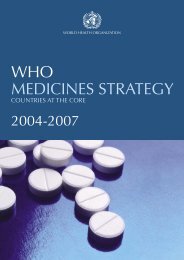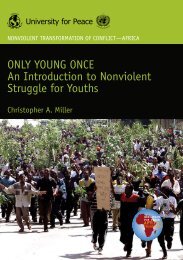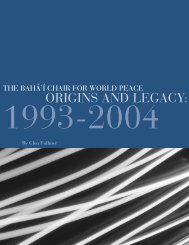them that she w<strong>as</strong> an Arab k<strong>in</strong> and that she w<strong>as</strong> ready to get killed before any <strong>of</strong>her husband’s relatives were killed. ‘Otherwise’, she told them, ‘restore the stolenlivestock peacefully’, which they did and the crisis w<strong>as</strong> averted.Over the course <strong>of</strong> time almost all peace-mak<strong>in</strong>g <strong>in</strong>stitutions and practices havebeen weakened or abolished, mostly by misguided decisions or neglect from thecentre. Follow<strong>in</strong>g the October upris<strong>in</strong>g (1964), the caretaker, radical governmentp<strong>as</strong>sed a resolution for the dissolution <strong>of</strong> native adm<strong>in</strong>istration (see Bakheit <strong>in</strong>H<strong>as</strong>an 1985). The resolution w<strong>as</strong> not implemented be<strong>cause</strong> the conservative governmentthat succeeded the caretaker government ignored it. Then <strong>in</strong> 1969 anotherradical government came to power and it actually dissolved the system <strong>in</strong> 1970,unseat<strong>in</strong>g almost all top leaders. It created chaotic conditions <strong>in</strong> the rural are<strong>as</strong>,such <strong>as</strong> Darfur, <strong>as</strong> tribesmen hav<strong>in</strong>g had access to firearms took the law <strong>in</strong>to theirown hands and started resolv<strong>in</strong>g their disputes by the use <strong>of</strong> force.The tribal festivals also disappeared with the abolition <strong>of</strong> native adm<strong>in</strong>istration.The khalwa and the Sufi tariqa lost their magnetic force, <strong>as</strong> <strong>in</strong>tertribal <strong>conflict</strong>s gaveprom<strong>in</strong>ence to tribal loyalty rather than to religious affiliations. With the establishment<strong>of</strong> authoritarian rule, the popular political parties became the target <strong>of</strong> attackby such governments. They were banned and their leaderships impoverished andfollowers were either bought or forced to become supporters <strong>of</strong> the authoritarianrulers. It goes without say<strong>in</strong>g that <strong>in</strong>termarriages, friendships, exchange <strong>of</strong> giftsetc. all went away with the chang<strong>in</strong>g <strong>of</strong> the traditional values through policies <strong>of</strong>the central governments.Darfur region is now undergo<strong>in</strong>g what h<strong>as</strong> been described <strong>as</strong> the worst humancrisis at the time, be<strong>cause</strong> <strong>of</strong> onslaughts by tribal and ethnic groups. However, attemptsto re<strong>in</strong>state peaceful coexistence are underway. It prompts <strong>as</strong>k<strong>in</strong>g the question<strong>of</strong> whether such <strong>in</strong>digenous <strong>in</strong>stitutions and practices might be re<strong>in</strong>troducedif and when peace is restored for the region. Some prerequisites are highlighted <strong>in</strong>the conclusion and recommendations.ImplicationsThe content <strong>of</strong> the paper is b<strong>as</strong>ed on empirical data collected from a field visitto Nyala town <strong>in</strong> July 2003. The f<strong>in</strong>d<strong>in</strong>gs are significant on two counts. They areimportant at the African regional level, <strong>as</strong> many African communities are marred by<strong>in</strong>ter-communal <strong>conflict</strong>s, with no agreed upon solutions. An African conferencew<strong>as</strong> held <strong>in</strong> Arusha (Tanzania), dur<strong>in</strong>g the period (21-23 January 1998) to look <strong>in</strong>toAfrican experiences with <strong>conflict</strong> mediation. The conferees concluded, unfortunately,that such experiences were not available <strong>in</strong> a documented form (see Othoman2000). The Nyala field research could lay the foundation for Sudanese experienceswith promot<strong>in</strong>g peace and/or mitigat<strong>in</strong>g <strong>conflict</strong>s that might be <strong>of</strong> value to African76
esearchers and statesmen. A bigger project <strong>of</strong> data collection for experiences <strong>in</strong>all local communities will lead to document<strong>in</strong>g valuable experiences that Sudanmight <strong>of</strong>fer to other African communities. At the Sudan level, the postwar era,which appears imm<strong>in</strong>ent, needs the undertak<strong>in</strong>g <strong>of</strong> empirical research conducive tosusta<strong>in</strong>able peace. Indigenous <strong>in</strong>stitutions and practices, promot<strong>in</strong>g peace and/ormitigat<strong>in</strong>g <strong>conflict</strong>s, need to be identified and re<strong>in</strong>stated, so that they help <strong>in</strong> consolidat<strong>in</strong>g,build<strong>in</strong>g and preserv<strong>in</strong>g l<strong>as</strong>t<strong>in</strong>g peace.Conclusion and RecommendationsIt h<strong>as</strong> been argued that <strong>in</strong> rural Sudan some valuable <strong>in</strong>digenous <strong>in</strong>stitutions andpractices could be del<strong>in</strong>eated and shown to have been capable <strong>of</strong> promot<strong>in</strong>g peaceand/or mitigat<strong>in</strong>g <strong>conflict</strong>s; that the prime time for such <strong>in</strong>stitutions to flourishw<strong>as</strong> dur<strong>in</strong>g the colonial era <strong>of</strong> 1898-1956 (<strong>in</strong> Darfur, 1916-56). This had beenthe c<strong>as</strong>e be<strong>cause</strong> the colonial government had a vested <strong>in</strong>terest <strong>in</strong> pacify<strong>in</strong>g thesubjects through such <strong>in</strong>stitutions. Further, it w<strong>as</strong> genu<strong>in</strong>ely committed to humanrights at their b<strong>as</strong>ic level i.e. the protection <strong>of</strong> life and property and the settlement<strong>of</strong> disputes. It w<strong>as</strong> also committed to the eradication <strong>of</strong> slavery.Follow<strong>in</strong>g the atta<strong>in</strong>ment <strong>of</strong> political <strong>in</strong>dependence <strong>in</strong> 1956, however, little regardh<strong>as</strong> been given to such human rights. The overrid<strong>in</strong>g concern for most national,central governments h<strong>as</strong> become the build<strong>in</strong>g <strong>of</strong> political support at allcosts. It made central governments adopt misguided policies that greatly weakened<strong>in</strong>digenous <strong>in</strong>stitutions and practices. By weaken<strong>in</strong>g native adm<strong>in</strong>istration <strong>in</strong> particular,many other <strong>in</strong>stitutions and social values have also lost their vitality andsanctity, e.g. tribal festivals, the judiyya, the Sufi tariqa, the Quranic school etc.<strong>as</strong> well <strong>as</strong> social practices, which the tribal leadership used to give impetus andsupport. In general, be<strong>cause</strong> <strong>of</strong> misguided central policies, war culture h<strong>as</strong> replacedpeace culture <strong>in</strong> are<strong>as</strong> such <strong>as</strong> Darfur. Attempts are now underway to restore peaceto the war-torn region and this raises the challenge <strong>as</strong> to whether cross-cutt<strong>in</strong>gties that held the region together dur<strong>in</strong>g the colonial era (1916-1956) can be successfullyrestored.Some policy recommendations might be suggested <strong>in</strong> a bid to put the regionback where it w<strong>as</strong> at the colonial time. It is vitally important that a milieu <strong>in</strong> whicha peace culture can flourish must be created, namely, a genu<strong>in</strong>e governmental belief<strong>in</strong> human rights for all citizens, <strong>in</strong>clud<strong>in</strong>g, <strong>of</strong> course, the rural population. It isalso vitally important that decision makers consider ways and means <strong>of</strong> protect<strong>in</strong>g<strong>in</strong>dividual life and property, with social attention to be paid to people <strong>in</strong> the ruralare<strong>as</strong>.As it is unlikely, for re<strong>as</strong>ons <strong>of</strong> cost, for any central government to directlycontrol the local communities through modern government mach<strong>in</strong>ery, a form <strong>of</strong>77
- Page 1:
ENVIRONMENTAL DEGRADATIONAS A CAUSE
- Page 4 and 5:
Cover Photo:AU forces patrol Darfur
- Page 7 and 8:
PREFACEThese essays were originally
- Page 9 and 10:
AcknowledgementsThe conference was
- Page 11 and 12:
Executive SummaryByMary E. King and
- Page 13 and 14:
the theme of the conference, outlin
- Page 15 and 16:
• The question of warrior culture
- Page 17 and 18:
Deryke Belshaw, University of East
- Page 19 and 20:
area in West Darfur of 1.5m feddans
- Page 21 and 22:
on the interaction between conflict
- Page 23 and 24:
Conflict In DarfurHistorical andCon
- Page 25 and 26: distributive centre and where the r
- Page 28 and 29: sues quite separate. Evidence for t
- Page 30 and 31: FOOTNOTES1It is not my purpose here
- Page 32 and 33: 20On other emerging ethnically-base
- Page 34 and 35: IntroductionTHE Greater Darfur regi
- Page 36 and 37: 2. Agriculture (Farming)Crop farmin
- Page 38 and 39: Secondly, the demand for mutton and
- Page 40 and 41: groundnut and sesame as sources of
- Page 42 and 43: The situation of drinking water in
- Page 44 and 45: ReferencesConference, Meleet, North
- Page 46 and 47: IntroductionTHE residents of the Um
- Page 48 and 49: Phase Two:This phase was a monitori
- Page 50 and 51: zone southward — and to use these
- Page 52 and 53: • Some water points in places lik
- Page 54 and 55: This study and the seminar organize
- Page 57 and 58: Land Tenure,Land Use andConflicts i
- Page 59 and 60: tain innovations called hakura (pl.
- Page 61 and 62: mands for food production. All thes
- Page 63 and 64: Hashab Tenure SystemHashab ownershi
- Page 65 and 66: co-exist at the local level where e
- Page 67 and 68: IndigenousInstitutions andPractices
- Page 69 and 70: abs. In the past they had been invo
- Page 71 and 72: Sufi OrderSufi orders are religious
- Page 73 and 74: Native Administration, i.e. Tribal
- Page 75: Rizayqat homeland is at the extreme
- Page 79: ReferencesBakheit, Jaafar M.Ali. 19
- Page 82 and 83: IntroductionWHILE in the Sudan prot
- Page 84 and 85: ReferencesHarir, S. 1993. ‘Arab B
- Page 86 and 87: IntroductionTHE Darfur Region lies
- Page 88 and 89: Table (1)Water program for Darfur 2
- Page 90 and 91: anging from 150mm the north and 450
- Page 92 and 93: ReferencesIbrahim, Abdel Rahman Abb
- Page 94 and 95: CONCLUSIONTHE collection of papers
- Page 96 and 97: GLOSSARYAjawidArdaBaqqaraDarDukhnFa
- Page 99 and 100: A Darfur Timeline99
- Page 101 and 102: 1898 On the eve of the battle of Om
- Page 103 and 104: Bibliography103
- Page 105 and 106: El Mahdi S. Mohamed. 1979. Introduc
- Page 107 and 108: Tothill, J.D. 1948. Agriculture in
- Page 109 and 110: Biographical Sketch: Rex Sean O’F
- Page 111 and 112: 111











